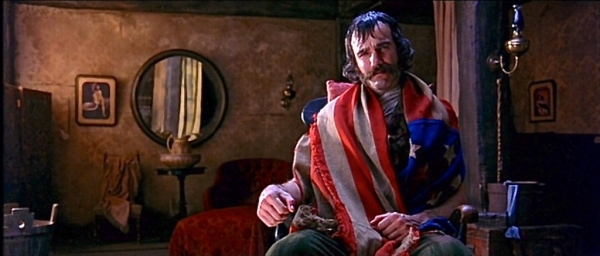Prompt: Analyze one scene in detail. How do the various elements either advance the narrative or reveal character — or both? Consider: color patterns, music, dialogue, lighting, composition, the point of view, camera technique…
Scene: 1:25:30 – 1:33:40, Amsterdam and Bill chat in private
The scene begins with Amsterdam awakening after having sex with Jenny and realizing that Bill has been sitting and staring at them while they slept.
The colors of this scene greatly contrast those of the previous scene. The brown, copper-like color and mist that was in the air in the previous scene are absent. Instead, there is exceptional clarity in what seems like a naturally sun-lit room. Immediately the red sheets, Amsterdam’s blue shirt and the red and blue of the American flag wrapping around Bill stands out — showing the patriotism of both characters in a land that they both claim. The clarity of this scene suggests that the audience should expect clarity in the characters.
 The room is silent. There is no music or voice-over in the entire scene. The scene starts with a long shot of the bed and Bill in the rocking chair with a mirror behind him. In addition, the source of light casts a shadow on each character’s face. After Bill initiates the conversion, there are close-up “American shots” which alternate throughout the conversation abruptly. The audience is forced to listen to every significant word in the almost unbearable silence.
The room is silent. There is no music or voice-over in the entire scene. The scene starts with a long shot of the bed and Bill in the rocking chair with a mirror behind him. In addition, the source of light casts a shadow on each character’s face. After Bill initiates the conversion, there are close-up “American shots” which alternate throughout the conversation abruptly. The audience is forced to listen to every significant word in the almost unbearable silence.
There is no use of the two-shot technique. Instead, to show the weight of the conversation, the shots are angled in front of the character who is speaking but not directly in front of their point of view — they do not look directly into the camera. Instead, it’s like looking through the eyes of a third person sitting between Bill and Amsterdam.
The cutting of the fixed shots in the scene juxtaposes the two characters in a conversation that paints them to be similar. In fact, the dialogue was essential in advancing this scene, the plot and the characters. Bill opens up to Amsterdam and discloses his age, and past with Amsterdam’s father. Bill shows that he trusts Amsterdam enough to describe his vulnerability after being beaten up by Amsterdam’s father. This is all done in confidence as Bill is not aware that the priest he has killed is Amsterdam’s father.
The angle of the shots forces the knowing audience to ask, “Does Bill know Amsterdam’s end-game?” “What will happen when Bill finds out after this?” Looking in as a third person, the audience is helplessly detached, and although they itch to reveal Amsterdam’s secret to Bill, they cannot. They anticipate the unpreventable actions that follow.
The dialogue builds upon the narrative by predicting the events to come. Bill explains that his fear is what kept him alive so long. Bill tells Amsterdam about being shamed by the priest and about rising back up and killing him. He even tells Amsterdam that to keep others in fear of him, he would kill a man and put his head on a stick for all to see. For anyone who has finished the film, the similarity in the events between Bill and the priest can be seen in those between Bill and Amsterdam.
Later in the film, Amsterdam is spared by Bill and left to live in shame. Like Bill, when he shamed by the priest, Amsterdam rises back up. To entice fear, he places a dead rabbit on the fence on the intersection of the Five Points. Eventually, he killed Bill. This scene was significant in influencing Amsterdam’s later actions that allowed him to triumph over Bill.
After they converse, Bill gets up. He towers over Amsterdam who is still sitting on the bed and the lower angle of the camera emphasizes Bill’s control over Amsterdam. Bill had casually mentioned that he never had a son while they were talking and as he left, he kissed his hand and placed it on Amsterdam’s head while Amsterdam looks down. When he leaves, Amsterdam cries. It’s questionable whether he weeps for his father, or for Bill, knowing that he plans to kill him.
There is a conflict in Amsterdam’s character that wasn’t there before. He has gotten closer to Bill and Bill has confided in him that he admired the priest. Bill mentions that he and the priest were alike in principles but only faith divided them. Now, Bill and Amsterdam are divided by circumstance.
Bill is no longer the tough, unscrupulous character that the audience thought he was. The audience’s view of him has changed. He too has suffered. Now, Amsterdam’s character is in question. What should he do? Does his newly formed relationship with Bill change his feelings about getting revenge? At the end of it all, Jenny asks Amsterdam, “Who are you?” and Amsterdam is silent. The shot focuses on Jenny and cuts out of the scene.
